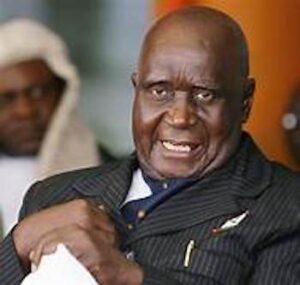
Kenneth Kaunda
*Kenneth Kaunda was born on this date in 1924. He was a Zambian educator and politician.
Kenneth David Kaunda was born at Lubwa Mission, then part of Northern Rhodesia, now Zambia, and was the youngest of eight children. His father, the Reverend David Kaunda, was an ordained missionary and teacher. His mother was also a teacher and was the first African woman to teach in colonial Northern Rhodesia. They both taught among the Bemba ethnic group in northern Zambia.
He followed in his parents' footsteps and became a teacher, first in Northern Rhodesia, but then in the middle of the 1940s, he moved to Tanganyika Territory of Tanzania. He also worked in Southern Rhodesia. He attended Munali Training Centre in Lusaka between 1941 and 1943. Early in his career, he read the writings of Mahatma Gandhi, who said, "went straight to my heart." For a time, he worked at the Salisbury and Bindura Mine. Kaunda married Betty Banda in 1946, with whom he had eight children. In early 1948, he became a teacher in Mufulira for the United Missions to the Copperbelt (UMCB). He was then an assistant at an African Welfare Centre and Boarding Master of a Mine School in Mufulira.
He led a Pathfinder Scout Group and was a Choirmaster at a Church of Central Africa congregation during this period. He was also Vice-Secretary of the Nchanga Branch of Congress. In 1949, Kaunda became the founding member of the Northern Rhodesian African National Congress. In November 1953, he moved to Lusaka to take up the post of Secretary General of the African National Congress (ANC) under the presidency of Harry Nkumbula. The combined efforts of Kaunda and Nkumbula failed to mobilize native African peoples against the white European-dominated Federation of Rhodesia and Nyasaland.
In 1955, Kaunda and Nkumbula were imprisoned for two months with hard labor for distributing subversive literature. The two leaders drifted apart as Nkumbula became increasingly influenced by white liberals and failed to defend indigenous Africans. Kaunda led a dissident group to Nkumbula that eventually broke with the ANC and founded his party, the Zambian African National Congress (ZANC) in October 1958. ZANC was banned in March 1959, and Kaunda was imprisoned for nine months. When Kaunda was released from prison in January 1960, he was elected president of the United National Independence Party (UNIP).
In 1960, he visited Martin Luther King Jr., and afterward, in July 1961, Kaunda organized a civil disobedience campaign in Northern Province and ran as a UNIP candidate during the 1962 elections. The UNIP created this–ANC Coalition government, with Kaunda as Minister of Local Government and Social Welfare. In January 1964, UNIP won the next primary elections, defeating their ANC rivals and securing Kaunda's position as prime minister. On October 24, 1964, he became the first president of an independent Zambia.
In 1973, following tribal and inter-party violence, all political parties except UNIP were banned through an amendment of the constitution after signing the Choma Declaration. At the same time, Kaunda oversaw the acquisition of majority stakes in key foreign-owned companies. The 1973 oil crisis and a slump in export revenues put Zambia in an economic crisis. International pressure forced Kaunda to change the rules that had kept him in power. Multi-party elections took place in 1991, in which Frederick Chiluba, the leader of the Movement for Multi-Party Democracy, ousted Kaunda. He was briefly stripped of Zambian citizenship in 1999, but the decision was overturned. He also wrote music about the independence he hoped to achieve.
Kaunda attributed his longevity to a strict vegetarian diet. He commented, "I don't take meat, no eggs, no chicken; I only eat vegetables like an elephant." He also avoided alcohol and gave up drinking tea in 1953. His wife died in 2013, aged 87, while visiting one of their daughters in Harare, Zimbabwe. On June 17, 2021, Kaunda died at 97 at Maina Soko Military Hospital. Thirty grandchildren and eleven great-grandchildren survived him.
President Edgar Lungu announced that Zambia would observe 21 days of national mourning. Kaunda's remains were taken on a funeral procession around the country's provinces, with church services in each provincial capital, before a state funeral at National Heroes Stadium in Lusaka on July 2 and interment at the Presidential Burial Site on July 7, 2021. Several other nations also announced periods of state mourning. Zimbabwe declared fourteen days of mourning; South Africa declared ten days of mourning; Botswana, Malawi, Namibia, and Tanzania all declared seven days of mourning; Mozambique declared six days of mourning; South Sudan declared three days of mourning; and Cuba declared one day of mourning. The President of Singapore offered her condolences to the politicians and people of Zambia for Kaunda's death.